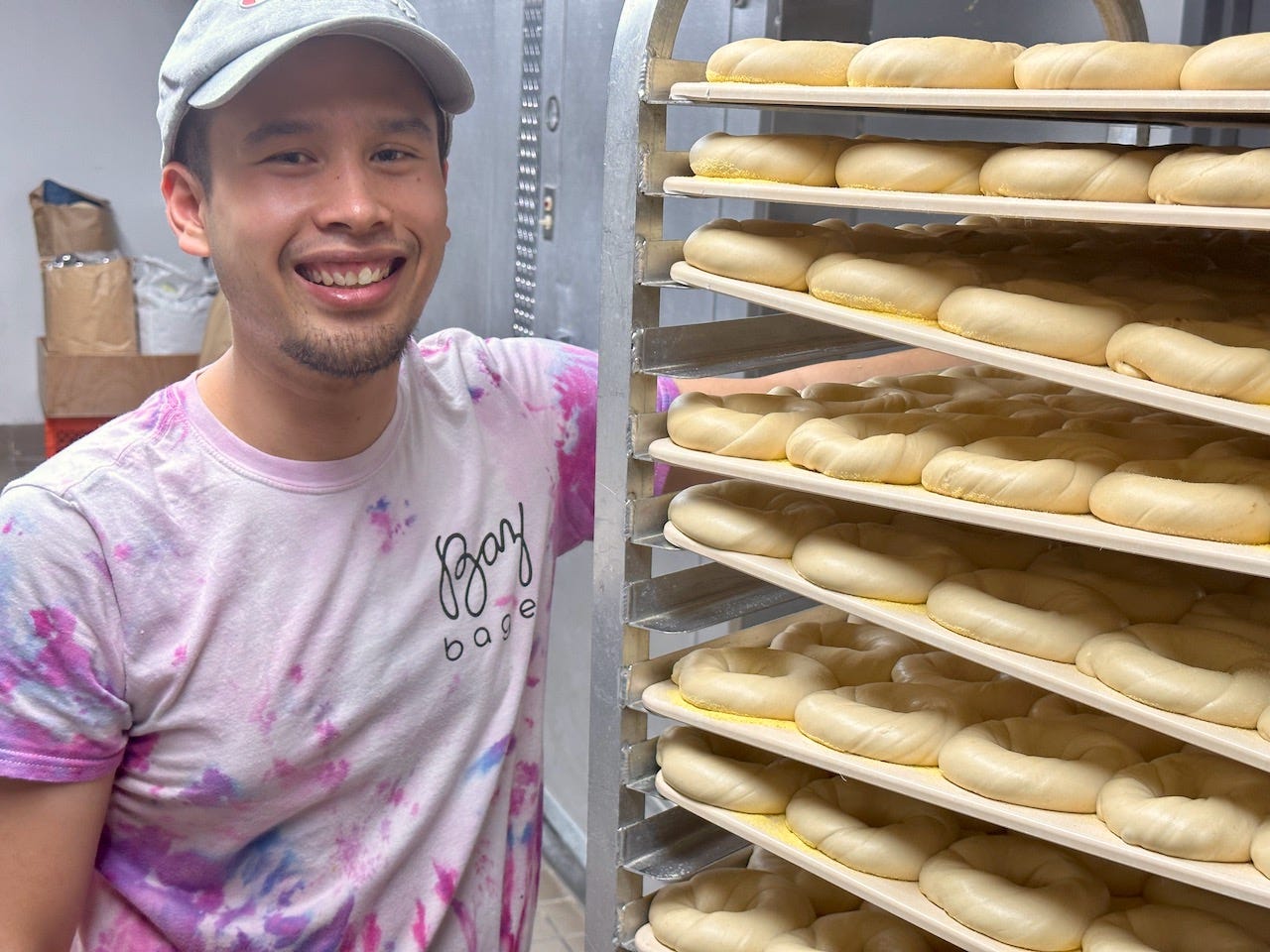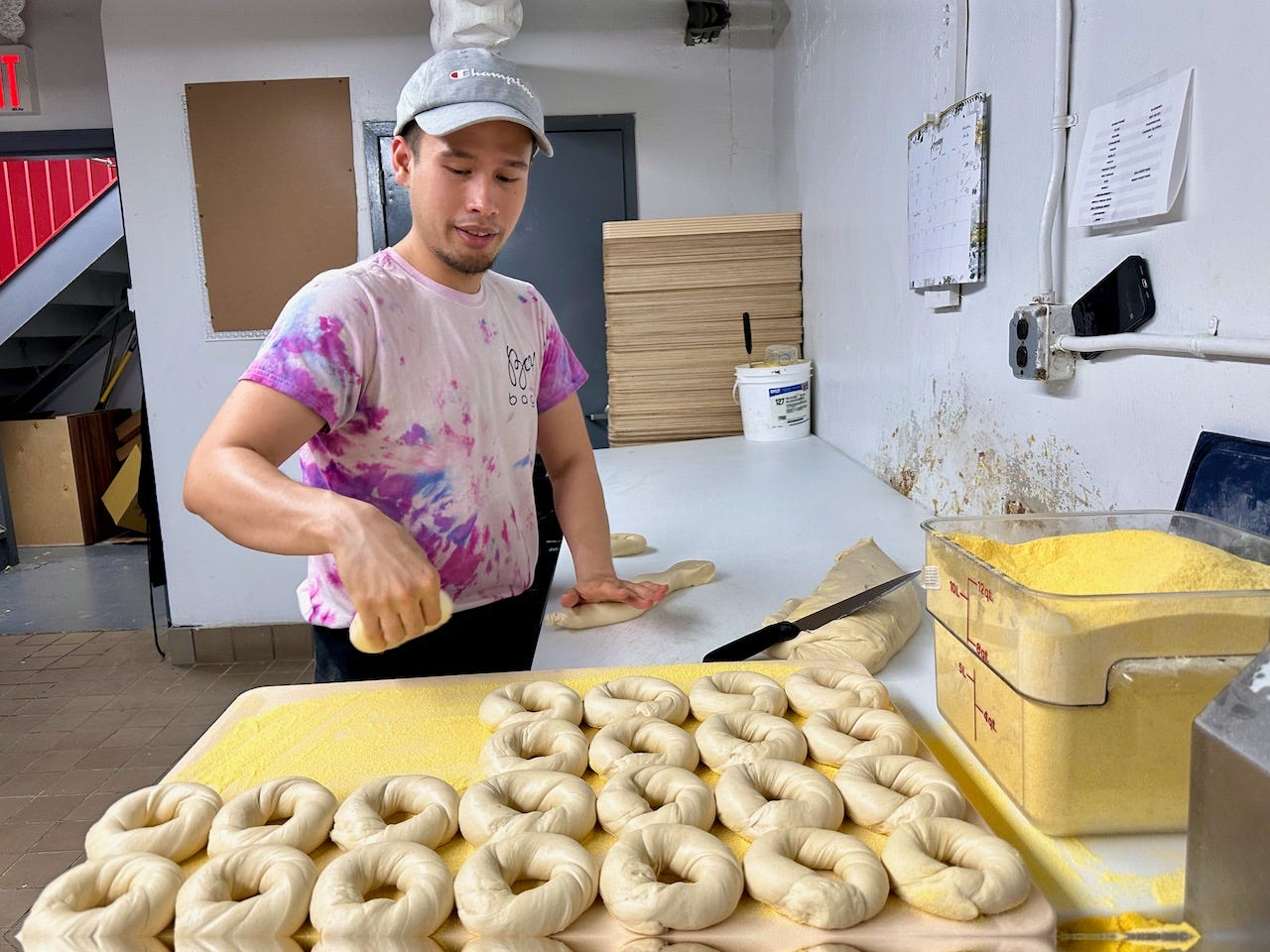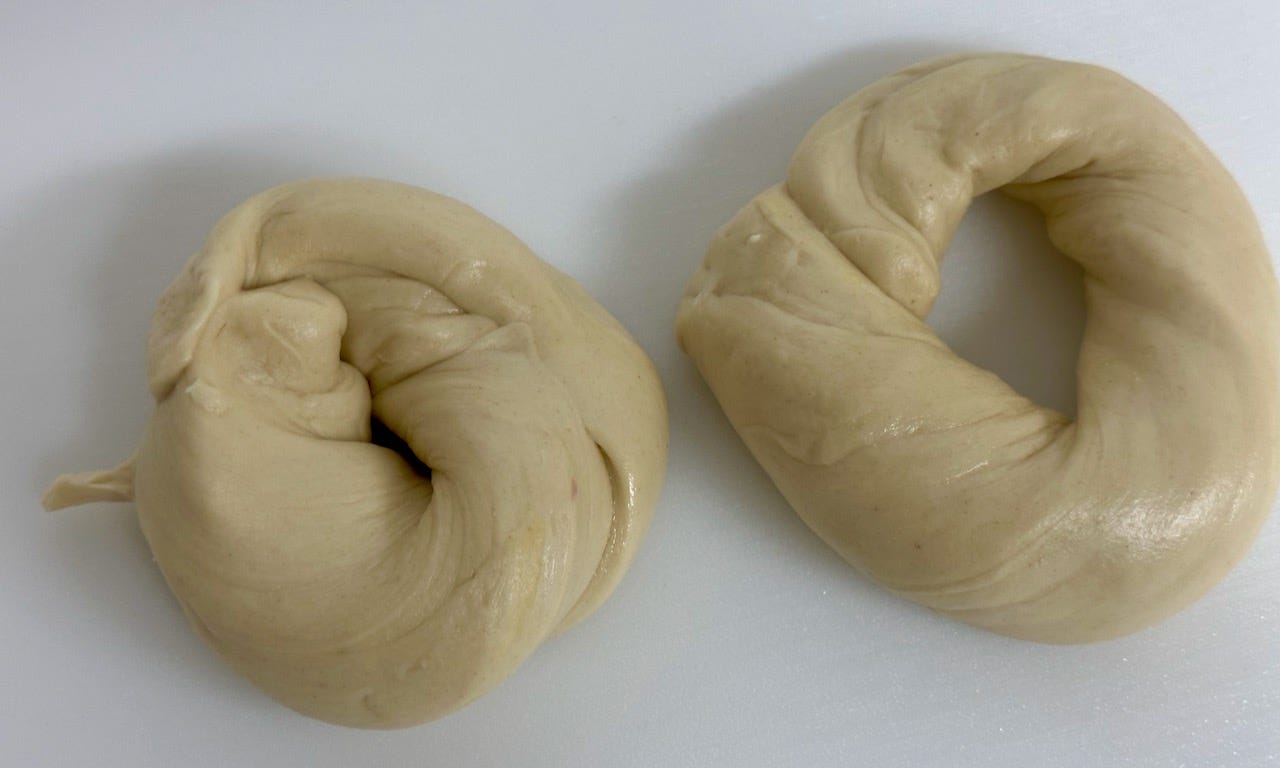Alex Baka Rolls Three Million Bagels a Year!
Plus! Hermit/Anchorite Poll Results!! Singapore Police!!!
Hello everyone,
Welcome to Issue #63 of CAFÉ ANNE!
Wowza! I got a lot of responses to last week’s poll, asking you to choose between spending the rest of your life as a hermit, in total solitude, or as an anchorite—an early medieval holy person who lived inside a small room on the side of a city church. An anchorite couldn’t leave the room until they died, but they could chat through a small window with passersby who came seeking their prayers and advice.
Many readers were NOT happy with the options. “I’d rather be dead than be either!” wrote reader Sheila R. in an email.
Others wanted to know more about the anchorite situation: “Does the window get good light? Would I be able to have some house plants in there? Is there enough room for a nice yoga practice?” emailed reader Julia S. on the Upper West Side. Another wanted to know if there would be air conditioning, or shutters on the window.
In the end, the hermit option won by a wide margin:
“I am definitely the hermit-type. I can’t imagine being cooped up in a one-room cell in the middle of the city,” explained reader Pamela in an email. “I need to be out in nature and have a sense of freedom to come and go as I please that an anchorite wouldn’t have.”
“I would hate to be in a cage, having people come by to talk to me if I didn't want to talk to them,” agreed reader Sarah B. “I would rather feel a little lonely than trapped.”
I chose the anchorite option, of course, but I am having second thoughts after hearing from reader Frank. D in Ohio. Frank did a little research and discovered the following anchorite fun facts:
-They entirely depended on public charity. If the population forgot about them, they died.
-Rules regulated the building of anchorite cells. One 12th-century text reports that the typical cell was about 8 square feet.
Frank also sent a little illustration he found, and it doesn’t make the gig look like much fun:
On the other hand, Frank wrote, “It’s just too bad YouTube wasn’t around in the 11th Century because it would have been fantastic to be an anchorite influencer.”
I only got a few folks writing in favor of the anchorite option. “I chose anchorite because I think I would mind being totally cut off from other people more than I would mind never going for a walk again - but both sound awful!” wrote Nathaniel in the comments.
And then there was an email from CAFÉ ANNE chief correspondent Aharon L. in South Slope, who explained his anchorite preference thusly:
1) It sounds dirtier
2) It is the PERFECT excuse for turning stuff down. "Sounds great but I CAN'T because I'm in a small room built into a church FOR LIFE. Tell the Cirque de Soleil performers I think they're VERY talented."
3) I am already effectively an anchorite.
I also received a note from my father, Philip K. in East Aurora: “Monks that lived in communities are properly called cenobites, the hermit types eremites. Your scholarly tip for the day.” Thanks Dad!
In other news, big CAFÉ ANNE shoutouts to our newest paid subscribers: Jenn H, Leigh W, Dawn S, LCW, and especially Wendy G, who bought a subscription for herself and one for a friend. What a fine example! Folks who subscribe to CAFÉ ANNE help keep it free for everyone. It’s just like public radio, only less tote bags and less vocal fry.
I am crazy excited about this week’s issue! We’ve got a profile of NYC bagel roller Affan “Alex” Baka, whose story is about as bonkers as it gets—at least when it comes to bagels. Please enjoy.
Regards!
Anne
SCREEN SHOT
When Cops Design Home Pages
Top CAFÉ ANNE correspondent Aharon L. was surfing the internets recently when he found the following image atop the Singapore Police Force home page:
Wowza! In case you are reading on your phone and the image is too small to convey details, please know that the graphic includes the following elements:
-Five armed law enforcement officials (including one in a fedora!) erupting from the skyline like vengeful gods.
-A giant cop car, lights flashing, hovering over the Singapore Straight!
-A smiling cop lady with a bicycle!
-A drone the size of Mars! (For zapping litterbugs?)
-A motorcycle cop riding on water!
Folks who explore the website will discover further delights, including the story of two cops who fell in love on the job and a special page devoted to “Police Day” —though isn’t every day Police Day in Singapore?
Is this image tongue-in-cheek or meant to be taken seriously? Either way, it’s not good! It almost makes me feel grateful for the prosaic tone of the NYPD home page, which is currently advertising for school crossing guards:
FEATURE
Alex Baka Rolls 3 Million Bagels a Year!
When I met Affan "Alex" Baka mid-afternoon in the basement of the Manhattan shop where he works as a bagel roller, he told me he was just finishing his workday.
"So when did your shift start?" I asked.
"I've been here since 1 a.m."
"What!?" I said. "It's 3:30 now. That's insane. Are you sure?"
He was sure. Mr. Baka, who is 28, often works a 14-hour shift. This day was typical. He took the midnight 7 train in from his home in Sunnyside, Queens (where all the best people live), and started his shift mixing 200 pounds of dough, dividing it into batches and adding flavorings including egg and blueberry.
An hour in, he cranked up the music (pop, reggaeton) to get motivated and started rolling. He took a breakfast break at 8 a.m.—an everything bagel with lox and cream cheese. And now he was working straight through to 4 pm without a lunch.
"Why?" I asked.
"I dunno!" he said. "The stores got busy. They started from one location and now we have five. It's nonstop. And people can't stop eating bagels!"
"Do you ever go outside during your shift?" I asked.
“No,” he said, "it's like you're in jail! Sometimes I call my wife, my dad, my mom. My bosses come down and talk to me, so there's some interaction throughout the day, but mostly I'm here alone."
I watched Mr. Baka cut ropes of dough from a thick slab on the counter and form them into uniform bagels before placing them on a baking sheet dusted with cornmeal. I was so astonished at how fast he works that I made a little video. If you watch, it looks like it's been sped up.
"Do you know how many bagels you can make in an hour?” I asked.
"Most likely 1000, 1200," he said. "You can see inside the walk-in cooler, what I did today."
We took a peek. I couldn't believe my eyes. Inside the cooler stood rack after rack of bagels—plain, whole wheat, poppy, sesame, egg, French toast, pumpernickel, blueberry, strawberry, red velvet, multi-grain, jalapeño cheddar and cinnamon raisin.
In one shift, Mr. Baka can roll 10,000 bagels—enough to supply all five of his employer's locations the coming day.
'What do you think when you look at that?" I asked.
"It's a good accomplishment," he said "How many people will eat these bagels! But tomorrow, when you come back, and it's empty, it sucks!"
Mr. Baka is one of roughly 60 professional bagel rollers working behind the scenes in New York's 250-odd bagel shops. Most shops don't sell enough bagels to require a full-time roller, so the typical bagel roller works part-time gigs in several shops around town. Because the trade is taxing and takes a year to master, top rollers like Mr. Baka are in high demand.
In a typical week, he told me, he works 14-hour shifts on Mondays, Thursday and Saturdays at the Midtown shop. After that shift ends, he might head over to a shop in Soho where he makes his specialty rainbow bagels. Sundays, Wednesdays and Fridays, he works long shifts at a shop in Garden City, Long Island. He also takes fill-in shifts for a client on the Upper West Side. He takes Tuesdays off. This adds up to roughly 100 hours a week.
"That's incredible," I said. "When I get home, I'll do the math and let you know you how many bagels you make in a year."
I texted him later: "You roll 3 million bagels a year! Isn't that nuts? 10,000 a day, six days a week, 50 weeks a year."
"OMG. Really," he replied. He added three laughing/crying emojis. "I never calculated. Damn, hahaha." This was followed by another laughing/crying emoji and then a pair of emoji monkeys with their paws clasped over their mouths in shock.
Mr. Baka is a bagel roller because his father, an immigrant from Thailand, was a bagel roller. Roughly 80% of the city's bagel rollers are Thai, he estimates. The rest are Hispanic, hailing from countries like Mexico and Colombia.
He and his nine siblings grew up in a two-bedroom apartment in Woodside Queens. The home was crowded. By the time Mr. Baka was five, his mother was yelling, "Oh, you're such a naughty kid, go to work! Go with your dad! I don't want to see you at home!"
He worked with his dad every weekend at bagel shops all over New York City. "I'd make mini bagels," he says. "I'd put them on the table, and he'd pick and choose which ones would be good. And the bad ones, he'd redo them for me."
There was a lot to learn.
"It looks easy—I'm just doing the same thing over and over," said Mr. Baka. "But there's a lot of different factors. Some days it’s hot, you have to adjust the water temperature, adjust the yeast, the amount of time you mix the dough. Everything. The dough is like a living thing. You have to learn to control it."
Even rolling a bagel isn't easy. Mr. Baka showed me how to grab a two inch-length of dough, roll it out and employ an upside-down flip of the wrist to twist it before pinching the ends together.
We gazed at my sorry-looking initial efforts.
"That's really good!" he said kindly.
When Mr. Baka was in eleventh grade, his parents moved the whole family back to Thailand. He missed New York City like crazy.
"It was my first time there. I didn't know the language, the culture was different, the way you dress is different," he said. "I cried."
After earning a three-year college degree in business administration, he moved right back to Woodside, Queens and landed a job at a bagel shop in Astoria—as the cleaning guy. "You have to work your way up," he says.
Bagel roller jobs aren't advertised—many work at the same shop for decades, and openings are shared through word-of-mouth. Mr. Baka's break came when he learned of a position on Manhattan's East Side.
His skills were rusty, and it took time to adjust to the lifestyle. "You gotta be determined," he said. "In the beginning it’s hard. You're not going to get a perfect circle. They get mad at you, yell at you. You have to stay strong. You have to have the guts and will to learn."
Soon he was working at some of the city's most high-profile shops. "It makes me happy to see customers eat the bagels," he said. "When I go upstairs for my breakfast break, it feels good. Someone eating your bagel—something you made. And when there's a line out the door in the morning, it makes me happy."
When Mr. Baka's shift ended, we went upstairs to finish talking over a cup of coffee. He told me he’s planning to open his own bagel shop in Midtown or Soho.
I asked if he knows much about the business side of things. "I already have my own restaurant," he said. "A Thai restaurant."
"What?" I said. "On top of working 100 hours a week as a bagel roller, you own a Thai restaurant?"
"It was always one of my dad's dreams to open one, but he never could," said Mr. Baka. "I said, 'What if I opened one?'"
He bought a place in Ridgewood, Queens last year with his uncle and sister. They remodeled it and reopened under a new name, Pattanian Thai.
Mr. Baka now spends his free Tuesdays doing the shopping and bookkeeping for the restaurant.
He also runs an Instagram account with 446 followers and offers free consultations to shop owners around the world who need help with their bagels. Some offer to fly him out, but he can't take the time off.
"When your last vacation?" I asked.
Mr. Baka says he takes a week or two of vacation every year. This past July, he returned to Thailand for his wedding. It was an arranged marriage.
"Was that the first time you met her?" I asked. “When you got married?"
"The day I gave her the ring!" he said. “That was a new experience. Here, it's different. You date first, then you get married. People call me crazy. 'What are you doing? You're signing your life away!’ But in my country, it's a tradition."
An arranged marriage is better, he said. "Your parents know a lot of people, and they know which will get along with you, because they raised you."
About meeting his bride Jasmine for the first time, he said, "It was good, I felt shy, I turned red. Slowly I started to love her."
Jasmine, a student, is still in Thailand, awaiting her immigration papers. But she often keeps Mr. Baka company over FaceTime while he rolls bagels. It keeps him motivated.
When she arrives, he hopes she will help him open and run the bagel shop.
"That's my dream, to own a bagel shop in New York City," he said. “Have kids with my wife, settle down, get a house some day."
I asked if he plans to hire a bagel roller when he opens his shop.
"Nobody does it like me," he said. "We'll see. Maybe I'll take a chance!"
CAFÉ ANNE is a free weekly newsletter created by Brooklyn journalist Anne Kadet. Subscribe to get the latest issue every Monday!


















Wow! Powerful story! My reverent attitude toward bagels feels justified.
I taught in Singapore for a few summers while in graduate school, and I can tell you, their state-run ads are no joke! I'm going to have to search deep in my camera roll to find some of the photos I took. I remember one with a gorilla and a slogan that was something like "don't make trouble."
And the bagel roller is just as charming and fascinating as I'd hoped he'd be. Love all the pictures and this inside look into how NY's favorite food gets made.